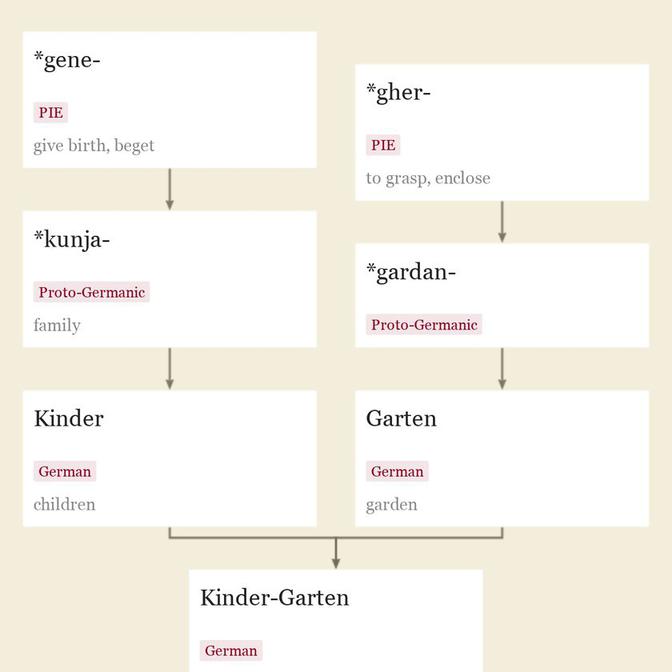nursery (n.)
约于1300年, noricerie,“婴儿和幼儿及其保姆的场所或房间”,源自古法语 norture, norreture,“食物,营养; 教育,培训”,源自晚期拉丁语 nutritia,“哺乳,哺育”,源自拉丁语 nutrire,“滋养,哺育”(见 nourish)。自约于1500年以来,“培育任何事物的地方”。作为一种为非常幼小的儿童开设的学校,始于1580年代。园艺意义上的“树木培育场所”始于1560年代。Nursery rhyme 最早见于1807年。
nursery 的相关词汇
约于1300年, norishen,意为“提供食物和饮料,喂养; 培养,促进(儿童、幼动物、恶习、感情等)的成长或发展”,源自古法语 norriss-,即 norrir 的词干,意为“抚养,培育,养育; 维持,供养”(12世纪,现代法语 nourrir),源自拉丁语 nutrire,意为“喂养,看护,培育,支持,保护”,源自 *nutri(nutrix 的旧形式,意为“哺乳的女人”),字面意思为“给予哺乳”,源自 PIE 语言的 *nu-tri-,是 *(s)nau- 的带有女性代理后缀的后缀形式,意为“游泳,流动,让流动”,因此“哺乳”,是 *sna- 词根的扩展形式。相关词汇: Nourished; nourishing。

1852年,源自德语 Kinder-Garten(1840),字面意思为“孩子花园,儿童花园”,是德国教育家弗里德里希·弗罗布尔(Friedrich Fröbel)(1782-1852)为了发展儿童智力而创造的隐喻名称。它由 Kinder “孩子”(Kind “儿童”的复数形式; 请参见 kin(n.))和 Garten “花园”(源自 PIE 词根 *gher-(1)“抓住,包围”的后缀形式)组成。COMPARE 双重意义下的 nursery。
Kindergarten means a garden of children, and Froebel, the inventor of it, or rather, as he would prefer to express it, the discoverer of the method of Nature, meant to symbolize by the name the spirit and plan of treatment. How does the gardener treat his plants? He studies their individual natures, and puts them into such circumstances of soil and atmosphere as enable them to grow, flower, and bring forth fruit,-- also to renew their manifestation year after year. [Mann, Horace, and Elizabeth P. Peabody, "Moral Culture of Infancy and Kindergarten Guide," Boston, 1863]
Kindergarten 指的是儿童花园,而弗罗貝爾(Froebel)是其发明者,或者更准确地说是 the discoverer of the method of Nature,他指的是通过这个名称来象征精神和治疗计划。园丁如何对待他的植物呢?他研究它们的个性特点,将它们置于适宜生长、开花结果和每年更新表现的土壤和气氛条件下。[曼,霍勒斯(Mann,Horace)和伊丽莎白·P·皮博迪(Elizabeth P. Peabody),《婴儿道德文化和幼儿园指南》,波士顿,1863]
1850年,德国天主教神父约翰内斯·朗格(Johannes Ronge)在英国建立了第一个儿童花园; 在美国,伊丽莎白·皮博迪于1868年在马萨诸塞州波士顿市创办了第一个儿童花园。这个术语在英国没有翻译,而其他国家借鉴这个机构则本土化了名称(例如丹麦的 börnehave,现代希伯来语的 gan yeladim,字面意思为“儿童花园”)。有时,它会部分地被翻译成 kindergarden(这种形式于1879年得到证实)。
- nurseryman
- *sna-